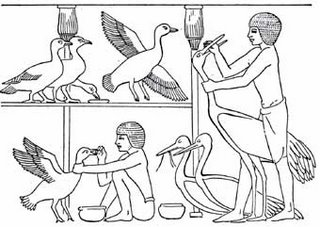EGYPTIAN FOOD
The Ancient
Bread and beer was the main elements to an Egyptians diet, no matter how rich or poor th e Egyptian was. Bread was the main meal for most Egyptians, and a meal could not be complete without it. Most kitchens were usually situated at the rear of the house, or on the roof. Egyptians cooked food in simple clay pots, using wooden utensils and jars for storage.
e Egyptian was. Bread was the main meal for most Egyptians, and a meal could not be complete without it. Most kitchens were usually situated at the rear of the house, or on the roof. Egyptians cooked food in simple clay pots, using wooden utensils and jars for storage.
Beer (known to the ancient Egyptians as hqt) was a very popular drink in Ancient Egypt. It was made from barley and sometimes to improve the taste the Egyptians would add spices. The importance of beer to the ancient Egyptians should not be underestimated as it was esteemed so highly that it was regularly offered as offerings to the gods. Even wages were sometimes paid by beer.
 Even the poor people of Ancient Egypt ate a fairly healthy diet including vegetables, fruit and fish. But it was only the larger plantations that grazed animals, mainly because the average farmer had to use his limited land to grow crops. Poultry was mostly roasted for the table, but meat was mainly the privilege of the rich. Seasoning included; salt, pepper, cumin, coriander, sesame, dill, fennel, fenugreek, seeds etc.
Even the poor people of Ancient Egypt ate a fairly healthy diet including vegetables, fruit and fish. But it was only the larger plantations that grazed animals, mainly because the average farmer had to use his limited land to grow crops. Poultry was mostly roasted for the table, but meat was mainly the privilege of the rich. Seasoning included; salt, pepper, cumin, coriander, sesame, dill, fennel, fenugreek, seeds etc.
All of the big festivals of the year were religious and organised by the temple priests. The biggest of these was the festival of the god Amun that lasted a whole month. Music, dancers, singers, acrobats and jugglers would accompany the religious procession. Much feasting and partying went on with a great deal of wine and beer being consumed. There would be; music, singing, story telling and the younger members of the family would dance to entertain the guests.
Although the ancient people did not write down their recipes, or use cook books, the ingredients needed to make most of the dishes are well known, many of which are still used in
There are plenty of books regarding the Ancient Egyptians diet and culture, but I recommend The Pharaohs of Ancient Egypt (Landmark Books) as a solid introduction to Ancient Egypt as it covers just about everything, and it is quite cheap!!!.








